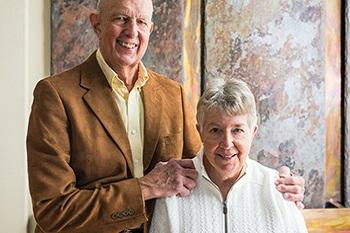
Drs. Gurpreet Baht, PhD and Phillip White, PhD are the 2021 recipients of the Borden Scholars Award. These grants are possible thanks to a series of very generous gifts from Dr. Ernest and Louise Borden (Duke Medical and Nursing School alumni). Their gift supports one-year awards that allow selected DMPI faculty to test new, emergent ideas with translational implications for which alternative sources of funding are not yet available. Dr. Borden built a successful career as a translational cancer research investigator and prominent leader at institutions including the University of Wisconsin Carbone Cancer Center and the Taussig Cancer Center of the Cleveland Clinic/Case Western University School of Medicine. Louise became a nursing supervisor specializing in rehabilitation at university hospitals of Duke, Jefferson, and Emory.

Dr. Baht’s proposal entitled “Meteorin-like protein improves immune response during aged bone fracture healing” will use proteomic techniques to investigate the role of immune cell to osteoblast communication in aged-associated deficiencies in bone fracture healing. His work is focused on investigating the role the immune system plays in age-associated deficits of bone fracture healing. Bone fractures occur in 50% of the population causing significant morbidity and mortality. Advanced age adversely affects bone repair and is associated with dysregulation of the inflammatory phase of bone repair which decreases differentiation of progenitor cells to osteoblasts and promotes differentiation to fibroblasts. In our proposal here we will investigate these signals that arise from inflammatory cells and result in decreased bone healing.

Dr. White’s proposal “Retrotranslation of molecular profiles associated with NASH resistance in humans” will test the therapeutic potential of a novel microRNA (miR) gene therapy approach for the treatment of non-alcoholic steatohepatitis (NASH) and fibrosis. Using small-RNA sequencing, White’s team discovered that one miR with gene targets in metabolic, inflammatory, and fibrotic pathways was strongly associated with protection from non-alcoholic steatohepatitis (NASH) in liver samples from persons with severe obesity carrying the common PNPLA3 I148M risk allele that is associated with higher incidence and severity of NASH. Here they will deliver the miR using an adeno-associated viral vector in a mouse model of severe NASH to determine if hepatic delivery of the miR can be employed to prevent NASH progression and fibrosis. Dr White’s team will employ single cell RNA sequencing to define the cellular and molecular targets of the miR in liver. These studies will provide the proof of principal required to advance White’s miR-based therapy for intensive testing as a NASH therapeutic.
